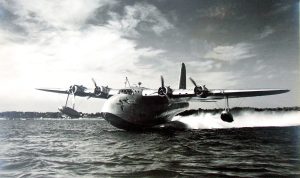Our nostalgia series reflects on the communities we all live and work in. This month, we’re taking a look at Poole’s fascinating flying boat history.
The Flying Boats of Poole Harbour
1939 – 1948
Poole Harbour and its approach, Poole Bay have a little-known but distinguished aeronautical history. It was on Bournemouth beach in 1912 that one of the very earliest meetings of ‘hydro-aeroplanes’ (seaplanes) was held, and in September 1919, the annual Schneider Trophy competition, an international race for seaplanes and flying boats, took place around the bay. However the busiest years were from 1939, when Poole Harbour became Britain’s only international civilian airport during the Second World War, and for three years afterwards.
In the years before the development of international airfields for land-based planes, flying boats, which could land on virtually any body of sheltered water, were seen as the future of international travel. In 1934 the country’s largest airline, Imperial Airways, won a Government contract to carry airmail to the many scattered countries of the British Empire. It commissioned a new generation of flying boats from the leading manufacturer, Short Brothers, known as the ‘Empire boats’, or C-Class, and started operations on Southampton Water in 1937. From here they opened up routes to Egypt and onwards to both South Africa and through the Middle East to India, Burma, Malaya, Singapore, Hong Kong and Australia. This is often referred to as the Golden Era of air travel, and by 1930s standards, this was both luxurious and fast, but it still took 5 days to Durban, 6 to Singapore and 10 to Sidney.
In 1939 at the start of WW2, flying boat operations were moved to Poole Harbour which, although smaller, was seen as a less vulnerable location. The Government nationalised Imperial Airways and its smaller rival British Airways and merged them as British Overseas Airways Corporation, which set up its first operational HQ in January 1940 at 4 High Street, Poole, now the town’s museum. Poole became an important military port; all private vessels were removed, heavy-duty moorings laid for the flying boats and a Flying Control Office established in the Harbour Club at Salterns, overlooking the landing areas. A fleet of launches to ferry passengers, freight, mail and fuel to and from the flying boats, was based in Fishermen’s’ Dock and, as the male launch-hands were gradually called up into the military, women were trained by BOAC as launch crew.
Throughout the war, BOAC’s flying boats from Poole Harbour provided the only regular scheduled service for post and priority passengers to the farthest parts of the British Empire and to North America. On most days there would be two early morning flights outbound, and two inward flights in the late afternoon. The routes established pre-war were inevitably vulnerable to the ebb and flow of hostilities and were varied as necessary.
Another user of the harbour during the early part of the war was the Fleet Air Arm with its seaplanes. In July 1940, the Navy moved one of its training Squadrons from the Solent to the Royal Motor Yacht Club on Sandbanks. Pilots who had already learned to fly conventional aircraft were put through the Basic Seaplane Training Course, learning to fly the various types of seaplane used in the service. Then Military flying boats arrived in Poole Harbour in August 1942, when Coastal Command of the RAF set up a base in Hamworthy to undertake anti-submarine patrols out into the Atlantic. The flying boats were briefly moved to Pembroke Dock to accommodate the build-up of Naval traffic prior to D Day. On 31st March 1948, BOAC moved its flying boat terminal back to Southampton, where more convenient along-side mooring facilities were available, so passengers no longer had to embark by launch. The airline eventually ceased all scheduled flying boat services in November 1950.
During its time in Poole, BOAC made more than 5000 flights from the harbour, and carried more than 34,000 passengers. The magnificent flying boats, and the extraordinary men who flew them, had kept open our communications with the vast British Empire, on which the country had relied so heavily to win the war.
Jeremy Waters.
Hon. President, Poole Flying Boats Celebration.




